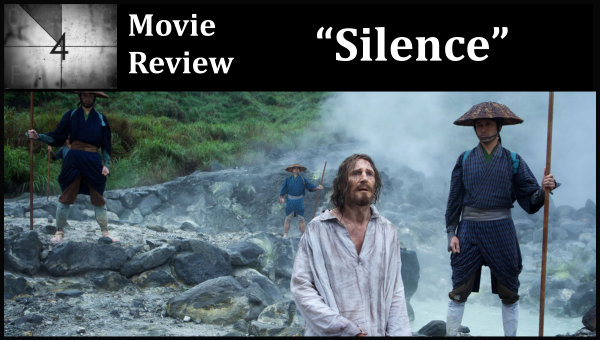By Tyson Thorne

I am certain many of our readers will be interested in hearing if they should see the latest “faith-based film” Silence, in select theaters now. I imagine some will know all they need to when they learn that this was directed and produced by Martin Scorsese, the man behind The Last Temptation of Christ, a movie that depicted Jesus having sex with Mary Magdalene. Scorsese, a self-professed Roman Catholic, now brings a film that puts the idea of “faith” under the bright glaring lamp of interrogation. There are two primary questions that demand an answer in this nearly three-hour motion picture.
The film is a fictional story about two Jesuit monks who set off to Shogun Japan to find their mentor who had gone missing. At this time in history, Japan, in a fit of Imperialism and a return to its cultural heritage, is seeking out Christians and demanding that they recant their faith or be horribly tortured and executed. The pair first encountered an orphaned Christian community living in fear and desperately wanting confession, communion and encouragement of their faith. This brings us to the first of those two questions, “What causes a person to cling to, or denounce, his faith?”
So you know, the movie makes no attempts to answer any of the questions it raises. For this reason, those who find more familiar faith-based movies, like God Is Not Dead, as two dimensional and preachy will likely find much to appreciate in this movie. It’s sweeping cinematic landscapes and painstakingly detailed depictions will delight the audiences who crave movies that win academy awards. People of faith who appreciates stands being made – even if they disagree with the stand – will be frustrated and argue that much of the films scenic frames should have found the cutting room floor in favor of a script that offered more solutions.
Possible answers to the first question include genuine belief, ego (not wanting to admit being wrong or being a sham), and even political (the mission is more about the Catholic church than it is Jesus). One of the people they encounter becomes their guide through Japan to Nagasaki where they find their lost colleague, who is rumored to have denounced his faith to save his own life. While the Jesuits cannot believe the rumor, it is a fact that their guide has done exactly this. The guide is a complex and depressing character who struggles with his guilt in having denied the savior he really believes in. He neither has the strength to kill himself as Judas did, nor the understanding of God’s grace that would allow him to rebound, as Peter did. As such his character begs the second question, “is there hope for the apostate?”
You should also know that while the movie doesn’t answer the questions it raises, it also depicts God as silent and completely removed from the event. This furthers the sense of hopelessness among the people of faith even further as they wonder why God doesn’t intervein. Everyone has a crises of faith moment, and everyone handles it differently. The definition of faith seems to be “being unsure of what they hope for and not completely convinced of what they do not see.” This is faith in a completely secular society, and it’s a faith that cannot work.
That sounds like a criticism buts it is isn’t. The approach to faith in the movie reveals Scorsese’s Roman Catholic roots, which believes that man is not completely corrupt and that by adding his faith to the power that God provides a person is made holy and complete. This system is destined to failure because it is unbiblical. 1 Peter 1.3-.7 teaches us that it is a work of God and, as such, God is at work in the lives of believers even when he appears silent:
Blessed be the God and Father of our Lord Jesus Christ! By his great mercy he gave us new birth into a living hope through the resurrection of Jesus Christ from the dead, that is, into an inheritance imperishable, undefiled, and unfading. It is reserved in heaven for you, who by God’s power are protected through faith for a salvation ready to be revealed in the last time. This brings you great joy, although you may have to suffer for a short time in various trials. Such trials show the proven character of your faith, which is much more valuable than gold – gold that is tested by fire, even though it is passing away – and will bring praise and glory and honor when Jesus Christ is revealed.
So the film is accurately depicting the results a false teaching. It’s got that going for it, I suppose.
Every year hundreds of thousands of Christians are persecuted and executed similarly at the hands of Muslims. To the persecuted I offer Revelation 6.9-11 as encouragement that Justice is coming. God may not act on our time table, but we are assured that when his mercies cease judgment is already on the horizon.
If anyone other than Scorsese had put this film together, perhaps at least one character might have demonstrated real faith and this film could have been more than the sum of its parts, but as it stands it offers a fake faith and no hope. Think-Biblically.com’s recommendation is to skip this in theaters and, if compelled, catch it on Netflix. At least then you can fast-forward through the lengthy panoramic shots and get to the meat. Also, you’ll be putting less money in Scorsese’s pockets. Both are wins in my book.
|
|
